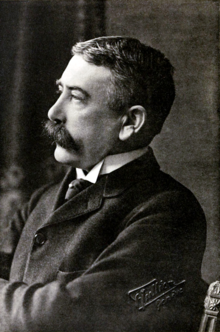
Back Ferdinand de Saussure Afrikaans Ferdinand de Saussure AN فردينان دو سوسور Arabic فيردينو دو سوسير ARY فرديناند دو سوسور ARZ Ferdinand de Saussure AST Ferdinand de Sossür Azerbaijani فردیناند دو سوسور AZB Ferdinand de Saussure BAN Фердынанд дэ Сасюр Byelorussian
Ferdinand de Saussure | |
|---|---|
 | |
| Born | 26 November 1857 Geneva, Switzerland |
| Died | 22 February 1913 (aged 55) Vufflens-le-Château, Vaud, Switzerland |
| Education | |
| Era | 19th-century philosophy |
| Region | Western philosophy |
| School | Structuralism, linguistic turn,[1] semiotics |
| Institutions | |
Main interests | Linguistics |
Notable ideas | |
| Signature | |
Ferdinand de Saussure (/soʊˈsjʊər/;[2] French: [fɛʁdinɑ̃ də sosyʁ]; 26 November 1857 – 22 February 1913) was a Swiss linguist, semiotician and philosopher. His ideas laid a foundation for many significant developments in both linguistics and semiotics in the 20th century.[3][4] He is widely considered one of the founders of 20th-century linguistics[5][6][7][8] and one of two major founders (together with Charles Sanders Peirce) of semiotics, or semiology, as Saussure called it.[9]
One of his translators, Roy Harris, summarized Saussure's contribution to linguistics and the study of "the whole range of human sciences. It is particularly marked in linguistics, philosophy, psychoanalysis, psychology, sociology and anthropology."[10] Although they have undergone extension and critique over time, the dimensions of organization introduced by Saussure continue to inform contemporary approaches to the phenomenon of language. As Leonard Bloomfield stated after reviewing the Cours: "he has given us the theoretical basis for a science of human speech".[11]
- ^ David Kreps, Bergson, Complexity and Creative Emergence, Springer, 2015, p. 92.
- ^ "Saussure, Ferdinand de". Lexico UK English Dictionary. Oxford University Press. Archived from the original on 12 July 2020.
- ^ Robins, R. H. 1979. A Short History of Linguistics, 2nd Edition. Longman Linguistics Library. London and New York. p. 201: Robins writes Saussure's statement of "the structural approach to language underlies virtually the whole of modern linguistics".
- ^ Harris, R. and T. J. Taylor. 1989. Landmarks in Linguistic Thought: The Western Tradition from Socrates to Saussure. 2nd Edition. Chapter 16.
- ^ Justin Wintle, Makers of modern culture, Routledge, 2002, p. 467.
- ^ David Lodge, Nigel Wood, Modern Criticism and Theory: A Reader, Pearson Education, 2008, p. 42.
- ^ Thomas, Margaret. 2011. Fifty Key Thinkers on Language and Linguistics. Routledge: London and New York. p. 145 ff.
- ^ Chapman, S. and C. Routledge. 2005. Key Thinkers in Linguistics and the Philosophy of Language. Edinburgh University Press. p.241 ff.
- ^ Winfried Nöth, Handbook of Semiotics, Bloomington, Indiana University Press, 1990.
- ^ Harris, R. 1988. Language, Saussure and Wittgenstein. Routledge. pix.
- ^ Bloomfield L., Cours de Linguistique Générale by Ferdinand de Saussure, Charles Bally and Albert Sechehaye, The Modern Language Journal, Feb. 1924, Vol. 8, No. 5 pp. 317-19
© MMXXIII Rich X Search. We shall prevail. All rights reserved. Rich X Search